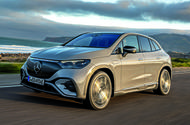Stuttgart continues to expand its family of luxury electric cars with another big SUV
There’s something reassuringly, quintessentially Mercedes-Benz about the name of the company’s latest electric car. It’s an SUV version of the Mercedes EQE saloon, so it has been called the EQE SUV – natürlich.Its mechanical specification is equally rational. Like the Mercedes EQE and the Mercedes EQS duo, it’s based on Mercedes’ Electric Vehicle Architecture, and it offers familiar motive machinery. A trio of dual-motor, four-wheel-drive models have been confirmed for the UK, making 288bhp (EQE 350 4Matic), 402bhp (EQE 500 4Matic) and 469bhp (AMG EQE 43 4Matic). Nothing is unusual about its smooth, rounded design, either. In fact, with a drag coefficient of 0.25, it’s Mercedes’ most aerodynamically efficient SUV to date. New wind-cheating developments include patented elements within the front wheelhouses and a flat belly with various tuning vanes. And along with the standard look, there are of course two sporty AMG Line packages, plus a wide array of alloy wheels, ranging from 19in to 22in.It perhaps goes without saying that the EQE SUV is roughly the same length as the combustion-engined GLE, at 4863mm, with a similarly long wheelbase, but it’s also significantly narrower, at 1849mm, and lower, at 1686mm. And you will not be surprised to learn that the cabin is similar in style to that of the EQE saloon, with most of its materials fittingly upmarket in feel, quality and ambience. As standard, you get a 12.3in digital instrument display and a 12.8in portrait infotainment touchscreen; or for £7995 you can have three screens blended into the dash-spanning 56.0in Hyperscreen. The flat floor combines with the long wheelbase to give a good deal of accommodation, particularly in the rear, with passengers enjoying lots of leg, head and shoulder room. At 520 litres, the boot is 90 litres down on the EQS SUV’s, although an adjustable rear backrest can be set more upright to liberate an extra 60 litres. It’s a broad and flat space, although it has a high loading lip, because one of the two electric motors is mounted at the rear axle.The entry-level 350 represents the sweet spot in the EQE SUV line-up. With a kerb weight of 2580kg, performance is strong but hardly overwhelming. Its 564lb ft of instant torque does result in abrupt initial acceleration, but it tails off quite markedly as rolling forces build. The drivetrain is terrifically refined, exceptionally smooth and vibration-free. The car’s slippery shape also ensures wind noise and buffeting around the mirrors stay at a minimum even on the motorway. The EQE SUV is the first Mercedes EV to receive a disconnect unit, which at low speeds in Comfort and Eco driving modes disconnects the front motor from the drive process (could you guess?), minimising mechanical drag losses for a 6% reduction in energy consumption. As we now expect of any premium EV, the EQE SUV also receives a heat pump in place of a regular air-con unit, bringing another 10% drop in consumption in cooler weather. With official economy of 2.8-3.4 miles per kWh, the EQE 350 SUV’s 89kWh battery offers up to 342 miles of range. It can be charged at 22kW by an AC wallbox or 170kW by a DC rapid charger – rather lacking when Kia’s latest EVs can handle 350kW.A double-wishbone front and multi-link rear steel-sprung standard suspension is mated with stroke-dependent dampers, while the optional Airmatic air suspension uses single-chamber plungers to give adjustable ride height and constant self-levelling.Fitted with the latter set-up, the EQE SUV is agreeably comfortable, with a generally absorbent ride in Eco, Comfort and Normal modes. With precise, lightly weighted steering, the EQE SUV proves undemanding in everyday urban driving. Here, the extra benefits of the optional rear-wheel steering system become apparent also: impressive manoeuvrability and a tight (10.5-metre) turning circle for such a sizeable machine.Selecting Sport mode adds weight to the steering and an underlying firmness to the ride, ramping up the interaction and body control. There’s substantial mass at play, but the EQE SUV is nevertheless quite agile, with reasonable amounts of grip and excellent traction. It also suppresses vertical movements well over winding and undulating country roads. Less well resolved is braking action. The pedal desperately lacks in feel, and there’s an odd movement to it as the brakes are pre-tensioned and ultimately triggered by the energy-regeneration function. Although the EQE SUV’s towing capacity won’t woo any countryside dwellers, at just 1800kg, its off-road capability just might. Its 169mm of ground clearance can be increased by 25mm with an optional Off-Road pack on Airmatic cars, plus there’s an optional ‘transparent bonnet’ function that displays the terrain beneath you on the touchscreen.So, the EQE SUV would be a very likeable and easy car for anyone to live with, its many positives outnumbering the odd negative. On the strength of this first drive, it’s Mercedes’ best EV yet – although at £99,260, a very expensive one too.






